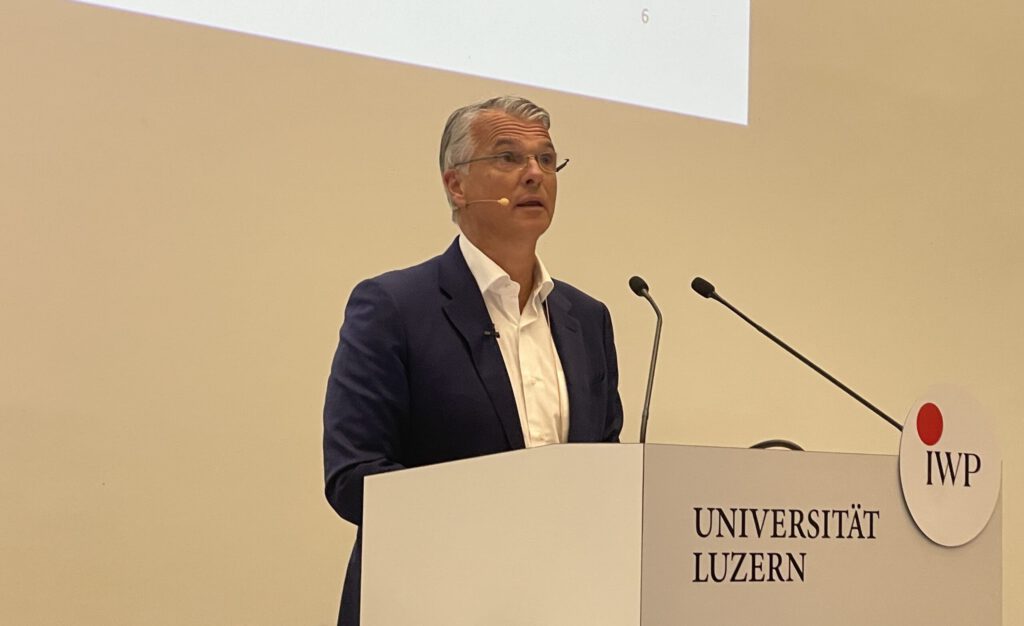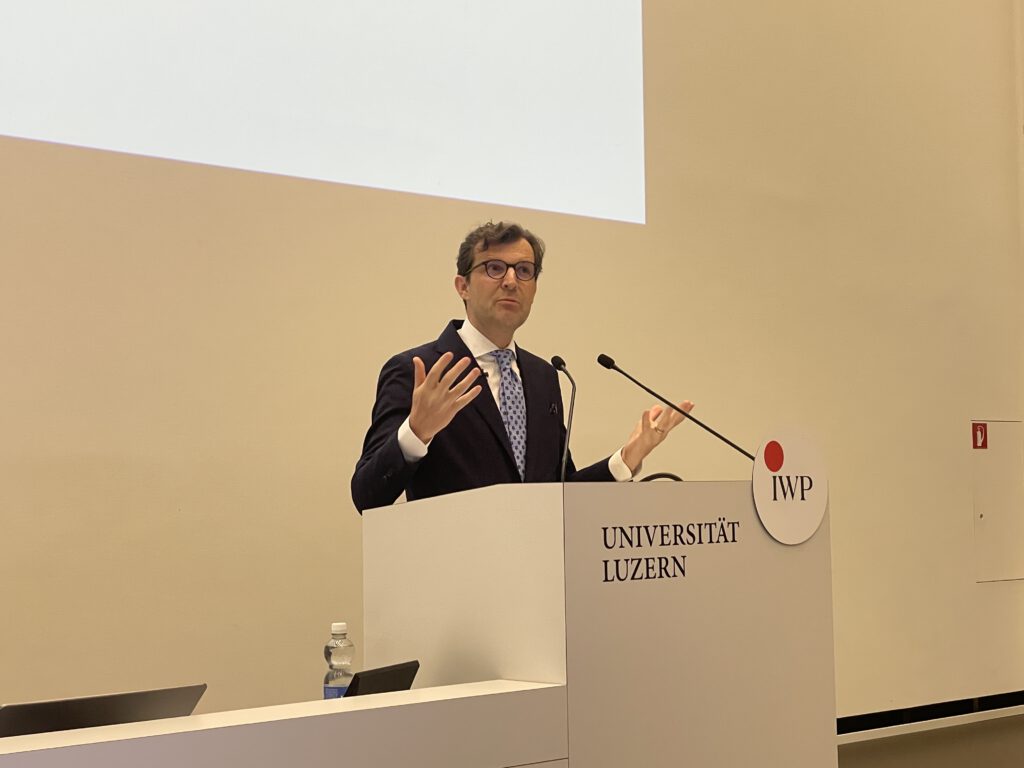
UBS CEO Sergio Ermotti scores points at the University of Lucerne. After his lecture, the audience is unlikely to want more regulation for banks.
Anyone wondering why Switzerland keeps caving in to stricter regulation need only listen to the CEO of major bank UBS.
Courage is followed by fear
On Tuesday evening, Sergio Ermotti appeared before hundreds of students at the IWP, the Institute for Swiss Economic Policy at the University of Lucerne, and presented a clever approach against more regulation.
He had the impression that Switzerland’s values had lost importance and that courage in the country had given way to a great deal of fear, Ermotti told the audience, which included muula.ch and former Federal Councillor and former Chairman of the UBS Board of Directors Kaspar Villiger.
Other key figures
Many voices see only dangers in the merger of the crisis bank Credit Suisse (CS) with UBS, instead of recognizing the advantages of a global and competitive big bank for Switzerland, Ermotti emphasized.
The UBS Group CEO played on three levels. First, he made clear the many advantages of UBS for the country, companies and the population.
Then he addressed the demands for more regulation and presented completely different key figures to the usual ones. And finally, he always played on the emotional level, which literally got under the skin.
Many benefits
The money from European clients alone secures over 20,000 jobs at UBS, Ermotti explained.
UBS lowers the financing costs for the public sector and provides cheap loans for citizens and companies.
The only remaining major bank contributes to the country’s prosperity, not only as a major taxpayer, but also as a sponsor of the national football team, as a purchaser of goods and services for around 4 billion Swiss francs, as an innovator and venture capitalist.


Alongside asset managers, venture capitalists, commodity groups, insurers and private banks, the big bank is part of the entire value chain in the financial center.
The financial world virtually enables the country to occupy leading positions in the industry.
The competition for leading financial centers, such as Hong Kong, Singapore and the USA, is not sleeping.
And the star banker cannot understand the logic that “small” is good and “big” is bad. The three largest companies in the country pay around 90 percent of corporate taxes.
Far fewer risks
There were repeated emotional interjections. Ermotti said that it should not be inferred from the demise of CS that the only surviving big bank had to pay for it.
Small Switzerland was doing much better than Austria, for example, and in terms of gross domestic product and median income, it was already outperforming its neighbors.
On the second level, the key figures, the UBS Group CEO pointed out that the merged bank had much lower risks and a smaller balance sheet total than CS alone had had some time ago.
In addition, UBS’s own funds were of a much higher quality, Ermotti emphasized.
Products sold on the balance sheet
The balance sheet total of the big bank should not be related to the country’s gross domestic product, but should also be compared with existing figures such as private assets in Switzerland or foreign assets, he lectured.
Apples and oranges are often compared, criticized Ermotti.
The balance sheet of an industrial company is very different to a bank balance sheet, he said, because the financial institutions show the products sold, loans and so on, in their books. This is not the case with industrial companies.
If a bank got into difficulties, the borrowers would have to continue paying anyway.
This makes a huge difference to the risks, because if an industrial company were to get into difficulties, factories, production facilities and other assets would lose value relatively quickly.
No experiments without necessity
Only liquidity could become a problem for financial institutions, which is why Switzerland needs to make improvements. Ermotti criticized the fact that the country had completely overslept on the introduction of the internationally standard Public Liquidity Backstop PLB.
CS’s resolution plans were also feasible, which shows that this should also apply to UBS, which is in a much better position.


However, taking the test while there was an alternative for CS, such as the merger with UBS, would have been irresponsible, the bank manager explained.
If the resolution plans for CS had been implemented in one weekend, the crisis bank would have been the best capitalized bank on the planet on Monday with 44 percent, according to Ermotti.
State aid granted everywhere
UBS did not even have a state guarantee, as the development of financing costs during the stress phase with CS had shown impressively. These had also risen sharply during the crisis.
In addition, the rating agencies do not take such a scenario of state aid into account – in contrast to actual state banks.
“Incidentally, nobody is talking about a state guarantee for companies that have received a lot of credit from the state during the coronavirus pandemic,” said Ermotti, again on an emotional level.
And even for airlines and energy companies, politics steps in to act as a lifeline time and again. This is therefore not an exclusive phenomenon just for banks.
Know-how and appropriate culture
No regulation in the world could have prevented the loss of trust at CS, Ermotti emphasized several times. UBS agreed with around 80 percent of the measures that the Federal Council had drawn as lessons from the CS debacle.
Risks could not be avoided, but the remaining big bank had the know-how and the culture to handle them with as little risk to taxpayers as possible, the UBS boss said with conviction.
A well-behaved audience
Ermotti left unanswered the question from the very well-behaved audience as to the point at which UBS would move its headquarters out of Switzerland – as star economist Hans-Werner Sinn had recently criticized at the IWP.
However, Switzerland needs UBS in its midst for greater prosperity, he said.
If the capital requirements were increased, this would not only have a negative impact on shareholders, but also on borrowers, many sponsorships and Switzerland’s success.
The Lucerne students, who were completely uncritical and focused on their own careers, then applauded for several minutes.
19.06.2024/kut./ena.




